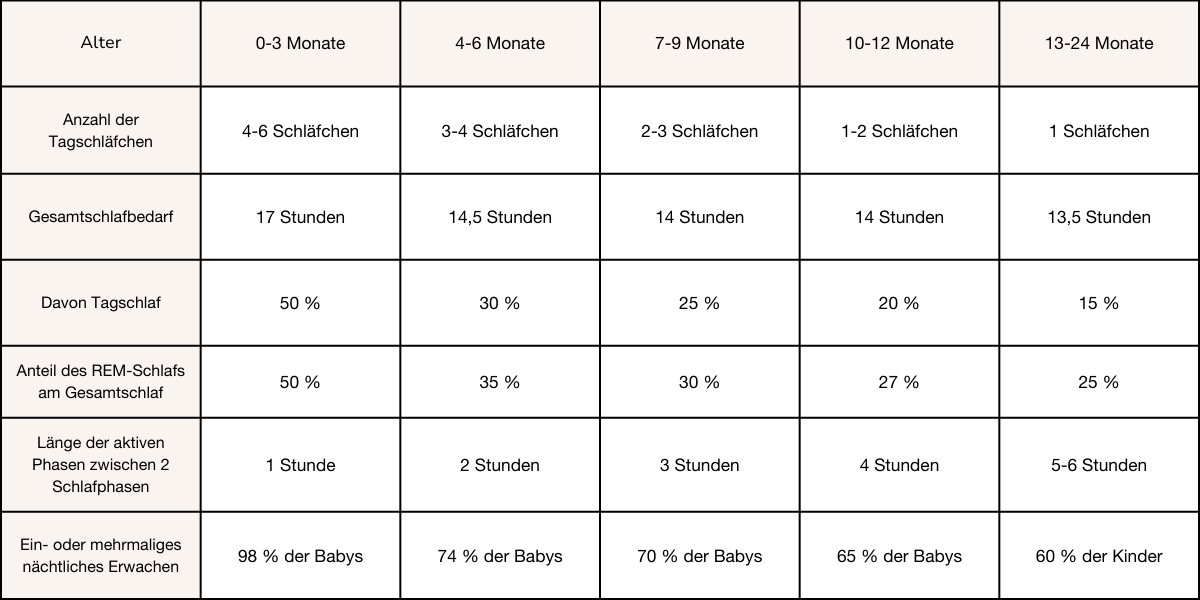Have you ever asked yourself whether your baby is getting enough sleep or maybe even sleeping too much? Whether the number of naps is enough or whether he or she is sleeping too often? Are you wondering why your child still isn't sleeping through the night?
I have asked myself the question several times: "Is there a 'normal' sleeping pattern for babies and toddlers or does it vary from child to child?" The answer to these questions is very simple: yes! And if you're thinking that's a contradiction, no, not really. Every child has their own individual sleep needs, but ultimately your baby's total sleep spread over the day and night should be within a range that depends on your little one's age.
Zombie or angel sleep: How does your baby sleep?
When I think back to the time shortly after the birth of our first child, I didn't really have the feeling that my darling's sleeping habits were normal. I barely slept a wink at night and looked like a zombie during the day. Friends and family looked at me with pity and I didn't recognize myself in the mirror. I thought the sleepless nights would never end. And then it was the last straw for me when other mothers said to me: "My child sleeps through the night, how does yours sleep?"
In the first weeks after birth…
- ...either you are lucky and your baby sleeps like an angel. You wonder why all the other mothers suffer so much because their babies don't sleep for 45 minutes at a time.
- ...or unfortunately you're unlucky and you're one of those mothers who, after just one week, don't know how they're going to get through another night without sleep.
If you belong to the second category, like most of us, I can give you hope and say: It will get better! Maybe not in the first few days and weeks, but your child will eventually sleep through the night and until then I am sure you will get through this time with flying colors!
Baby sleep and the first weeks after birth
I know how you feel and I know how difficult the first few weeks after birth are. Things usually start to get easier after week 6 and your baby slowly gets used to the day-night rhythm. Unfortunately, this does not mean that from week 7 you will have a perfectly sleeping baby who falls asleep at 7 p.m. and wakes up again at 6 a.m. for breakfast! Between the second and sixth month, the number of individual naps will decrease but the length of the naps will increase. However, no matter how the sleep is distributed, your baby should sleep approximately as much as you can see in the table below:

(The figures are average values, every baby is different, so the waking times must be adapted to the needs of the baby. Source )
Is my baby's sleep normal?
To give you the certainty that your baby is getting a "normal" amount of sleep, it is helpful to keep a sleep log for a few days. Make a note of how long and how often your baby sleeps. The total number of hours of sleep should be similar to the numbers in the table. Then everything is going well and you can sit back and relax. The time when you can sleep through the night again will soon come. However, if you notice that your baby is sleeping significantly differently than shown in the table, then one or more of the following reasons could be to blame. But don't worry, with a few simple changes to your daily routine you can quickly get it under control.
The 5 most common causes of your baby's sleep problems
#1 Your baby is awake too long between naps
If you take a look at the chart, you can see how long the time between naps should be. If your baby is awake for significantly longer, it is very likely that he or she is overtired. Even if you wish this with all your heart, newborns do not necessarily fall asleep when they are tired and need sleep. Often you have to actively encourage them to fall asleep. Follow the guidelines in the chart roughly and try to develop a sleep rhythm by putting your baby to sleep at roughly the same times every day.
#2 Your baby is not getting enough sleep
I know that the objection "my baby doesn't need that much sleep" comes up very often and maybe you were tempted to think that sentence yourself. The fact that it is often not so easy to put your angel to sleep reinforces this feeling immensely. I am not saying that it is easy, but it is one of the most important prerequisites for a good night's sleep and often the babies who have problems sleeping at night are the ones who don't get enough sleep during the day. Try to see the total amount of sleep in the table as a goal that you are working towards. If you stick with it, you will eventually manage to get closer and closer to the right amount of sleep. And maybe you can also treat yourself to an hour or two of sleep that you missed during the night!
#3 Bedtime in the evening is too late
There are usually two reasons for this:
- Between birth and 6 months, babies tend to nap in the late afternoon or early evening. This often pushes bedtime to 10 p.m. This is perfectly fine during this time. However, once late afternoon naps are no longer taking place, it is important to adjust bedtime accordingly. For example, move the nap from 10 p.m. to 7 or 8 p.m.
- I know you want to sleep in in the morning, maybe even cuddle a little with your partner in bed, after all, time together is very rare at the moment. So it's understandable that you try to keep your baby awake longer so that he or she sleeps longer than 6 a.m. Unfortunately, that doesn't work. Your little darling will still wake up around 6 a.m. and the only result is that your baby doesn't get enough sleep. So it's important that you put your baby to bed early so that he or she can gather enough energy for the next day.
#4 Your baby doesn’t take a nap at all
In your circle of friends or in your playgroup, there are some parents who are convinced that their child no longer needs a nap. The reason is simple: children don't fall asleep on their own, so you think they no longer need it. However, the majority of children under 3 need a nap. Their bodies are in a phase of rapid growth and at the same time they are bombarded with so many new impressions every day that they need time to recharge their batteries. Even if it's not easy, it's all the more important that you get your child to sleep.
#5 Your baby does not develop a day-night rhythm
You probably know that babies do not have a day-night rhythm in the first few weeks after birth. However, in order to understand and develop this, your baby needs your help. Only if you use rituals and behavior to show him when it is day and night will your little one soon understand this better and adjust his sleep accordingly. For example, rituals before bedtime are helpful, such as bathing your baby, reading a story, playing certain music. You should also only speak in a hushed voice and dim the lights as much as possible.
Even if you change your little one at night, you should remain calm. This will help your baby to understand the daily rhythm over time.
Conclusion
As you can see, there is a natural sleeping pattern for babies, or a direction as to how much your baby should sleep on average. However, you must not forget that your little one has his or her own individual needs. How and when your baby can most easily meet his or her sleep needs depends on this.
Try to find out when and how long the naps should be during the day and you will soon find the optimal rhythm for you! By the way, if you don't yet know where your baby sleeps, then take a look at the article "Where my baby (really) sleeps".




Leave a comment
All comments are moderated before being published.
This site is protected by hCaptcha and the hCaptcha Privacy Policy and Terms of Service apply.